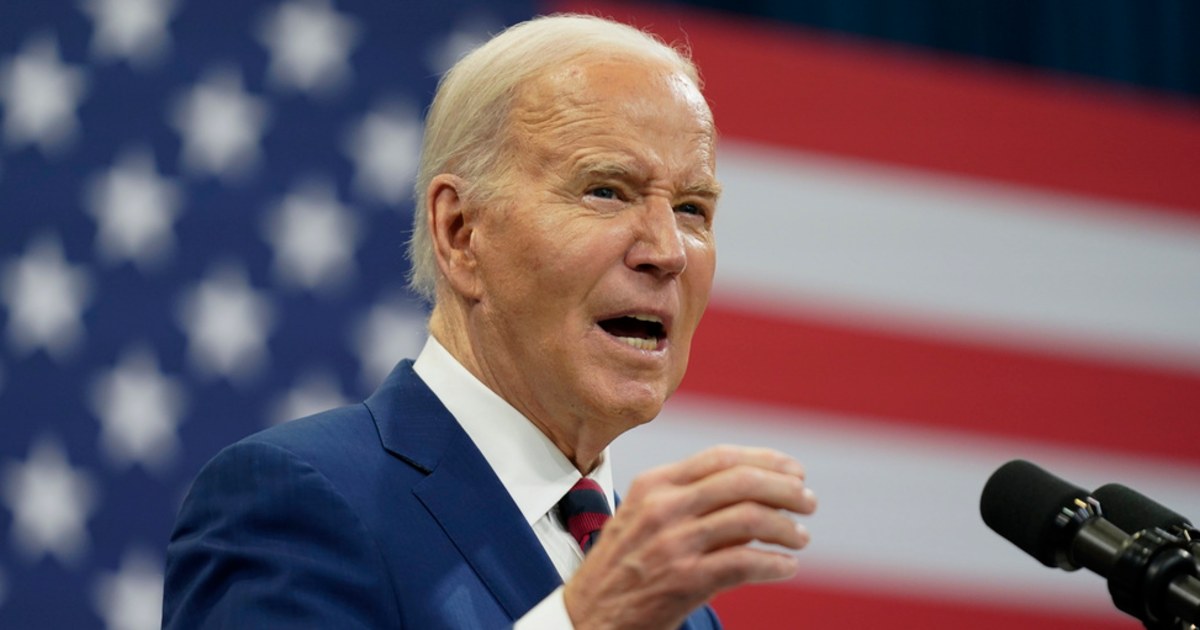By Phil McCausland -
NBC News
Every morning, Christina Preston walks into the West Community Opportunity Center in Franklin County, Ohio, and knows that she, and her staff, will be inundated with calls and requests from people in urgent need of help.
His desperation could get worse next month when the national public health emergency ends.
That could cause millions of people to lose access to Medicaid and other benefits.
"We're planning it as best we can, but right now, we think the method we'll implement is triage," said Preston, director of the local division of jobs and family services in Columbus, Ohio.
“Right now, I can't even imagine it.
It's going to be huge. "
Latinos are the group of the US population with the least access to health insurance
Sept.
14, 202101: 19
Across the country, local agencies like Preston's are preparing to undo the expanded social safety net that was created in response to the pandemic.
But the biggest challenge will be dealing with the end of ongoing Medicaid coverage which,
unless extended by the Biden Administration, will expire on January 15
when the public health emergency period ends.
The provision, a requirement of the Families First Coronavirus Response Act that was passed in March 2020, prevented states from removing Medicaid recipients from the program's rosters.
At least 11 million people have signed up for Medicaid since February 2020.
Up to 15 million Americans, including nearly 6 million children, could be at risk of losing their Medicaid eligibility
when protection expires, according to the Urban Institute, a public policy and economic research group.
The change could have a huge effect on communities of color, that organization concluded.
Health coverage activists in Chicago, Illinois, on July 20, 2021 Shafkat Anowar / AP
Many are likely to be eligible for other forms of subsidized coverage, according to the Urban Institute's analysis, but there is concern that few people know they are in danger of losing Medicaid and are eligible for other types of health insurance.
The researchers caution that little attempt has been made to communicate those options to affected people, and not all states are addressing the problem in the same way.
“The time to start planning this was yesterday,” said Cindy Mann, a Manatt Health partner who was director of the Center for Medicaid and CHIP Services during the Barack Obama administration.
"Actually, we don't have any more time."
In some cases, Americans struggling to assess their eligibility and try to find new health care plans may find themselves faced with state policies that seek to cut expenses by aggressively removing people from Medicaid rolls.
Illinois Immigrants Celebrate Medicaid Expansion Regardless of Immigration Status
July 20, 202101: 35
Dealing with disenrollment from Medicaid next year is "the looming monster," said Preston, who compared it to the overwhelming number of calls and cases the country experienced when a record number of people filed for joblessness.
In addition, the people affected by this measure would be served by local agencies struggling with various constraints such as staff shortages and motivational problems.
"Everything that has accumulated causes a lot of burnout, a lot of frustration, and unfortunately many people have quit their jobs," said Preston, who noted that it takes 12 months to train a new caseworker.
Does having used Medicaid for a long time affect me to apply for citizenship?
April 22, 202100: 51
Continuous coverage vs.
state budgets
At this time, states must keep people on Medicaid lists during the public health emergency, unless they move out of state or request to be removed.
When the public health emergency ends,
states will have 12 months to complete enrollment and determine eligibility status for all beneficiaries.
The Centers for Medicare and Medicaid Services reported that between February 2020 and May 2021, enrollment in Medicaid and CHIP increased more than 17% (about 11 million people), which is considered the largest increase in enrollment registered in a period of 18 months since the program began.
In 2020, federal spending on this initiative grew 9.2% to 671.2 billion dollars, due to growth in enrollment.
But when the emergency is over, Medicaid recipients could exit the program for a seemingly minor infraction such as not updating their personal information, something they haven't had to do since March 2020, or not receiving a letter about changes in your status.
I have DACA.
Can my children apply for Medicaid?
Jan. 7, 202100: 47
This raises great concern because many people moved during the pandemic and a large number of those receiving Medicaid were also affected by the eviction crisis, said Stan Dorn, director of the National Center for Innovation in Coverage at Families USA, a group defense of consumer health.
"Many people in difficult circumstances are not going to receive these notices," Dorn said.
"If English is not their main language, if they have to enter documents and do not have good internet access, or if they have several jobs, this is not going to be an easy task for those people."
Government officials and health care advocates emphasized how big this change in American health care coverage would be, noting that this will happen while the country is still fighting the spread of the coronavirus.
"This could be the biggest transition in healthcare since the Affordable Care Act was passed," said Dorn.
"But instead of being positive, it would be in a negative direction for coverage."
Could you be denied residency if your minor child receives Medicaid?
Aug. 15, 201903: 12
As federal funding for state Medicaid programs is expected to decline rapidly in the months after the public health emergency ends, some states are debating how fast they will execute the process of trimming the lists.
In Ohio, the Republican-controlled legislature included in the budget passed earlier this year that the state must complete those processes in 90 days, but right-to-health activists and advocates say that is not enough time to analyze the 3.2 million Medicaid recipients in Ohio and ensuring that people who remain eligible do not exit the program.
Erica Crawley, a Franklin County commissioner who oversees the jobs and family services program and who fought the 90-day budget provision when she was in the legislature, said that in her county - which includes Columbus - about 460,000 people they would have to be processed in 90 days.
With around 300 case managers, each of them would have to process more than 1,500 requests within 90 days.
Insurers exclude from total health coverage those who have not been vaccinated against COVID-19
Aug. 21, 202101: 46
"That's just for Medicaid.
We are not talking about SNAP.
We are not talking about cash assistance, and there are also new applications that need to be processed, ”Crawley said.
"We're talking about more than 15,000 overtime that would have to be approved to get it processed."
The Ohio Department of Medicaid declined to comment for this story.
The Ohio governor's office did not respond to a request for comment.
Tim Schaffer, a Republican senator from Ohio and architect of the 90-day program, did not respond to a request for comment.
In Republican states, there is concern that a longer and more methodical beneficiary determination process, coupled with reduced federal funding, could be extremely costly for states.
[This is how the public charge rule works: how it affects immigrants who receive aid]
Ohio has gone so far as to allocate $ 35 million for a third-party vendor called the Public Consulting Group.
The company says it can automate eligibility by verifying third-party sources and would get the job done in a few days.
According to the November newsletter of the Ohio General Assembly Medicaid Oversight Committee, the state would only pay 10 to 20% of its funds to the company.
The Boston-based company did not respond to a request for comment.
This method is considered controversial by some for its speed and the payment system that some health advocates say is similar to paying a reward for taking away residents' access to healthcare.
Yet across the country, federal and state officials are making preparations and discussing ways to tackle that vast administrative task that could have a major influence on state budgets and the number of people with health care coverage in the regions.
New York's Undocumented Will Get Free Health Insurance
May 8, 201901: 49
The Centers for Medicare & Medicaid Services have reached out to the states and tried to devise a best practice approach.
Most essential, according to officials, is to warn of the upcoming disenrollment period and to ensure that state Medicaid offices and local agencies inform people of the other health care options that exist.
Daniel Tsai, director of the Center for Medicaid and CHIP Services who was appointed in June, said his office has created a task force with about 25 state Medicaid agencies to discuss best practices for addressing a problem “without precedents ”.
They then meet with the remaining states on calls, which include more than 700 people, to communicate their findings.
The approach of Tsai and Chiquita Brooks-LaSure, administrator of the Centers for Medicare and Medicaid Services, has been to ensure that those who remain eligible maintain coverage and those who are no longer eligible can opt for other forms of coverage, but that also entails great challenges.
The agency prepared a checklist for states to encourage them to begin communicating changes and to work closely with health care systems, community groups, and other organizations to ensure the transition is as smooth as possible.
The challenge is huge, Tsai said, but it has sparked some innovations as they work to connect state Medicaid agencies with health care markets.
"We try to be very aware of the realities on the ground and also to make sure that we are using literally every means possible to help preserve coverage and access for people," Tsai said.
Why do Latinos have less access to vaccines against COVID-19?
Jan. 28, 202103: 49
The next challenges
The Build Back Better Act, one of the Biden Administration's most important bills, provides some safeguards to further protect Medicaid recipients and prolongs federal funding provided to states, but that could create additional administrative hassle.
The bill, which is unlikely to pass before the new year, seeks to keep federal funding until the end of September, though it would drop by roughly half at the end of March and decline further by the end of June.
This would allow states to only end coverage for people who have been enrolled in Medicaid for 12 consecutive months.
This provision would limit the monthly number of beneficiaries a state could withdraw from the program, as well as require states to attempt contact through methods other than mail, and require greater oversight and reporting to the federal government.
Illinois will give free health coverage to those over 65 regardless of their immigration status
Dec. 2, 202000: 17
States, like those that rejected Medicaid expansion, could decide to forgo additional federal funding and avoid all those rules and administrative burdens.
"States are looking at these measures to decide whether it is worth meeting the requirements in exchange for the improved [federal funding],
or whether it makes more sense to run redeterminations at a faster rate
," said Jennifer Tolbert, associate director of the Kaiser Program. Family Foundation on Medicaid and the Uninsured.
Whether states choose to participate or not, it appears that Tsai and other officials at the Centers for Medicare and Medicaid Services are preparing to closely monitor what states are doing and determine if they are eliminating people without following up. necessary.
Meanwhile, Tsai said the amount of work centers and states have done to try to stem the flood of changes to Medicaid coverage and ensure that people are connected to other forms of health care coverage is unprecedented.
"It's kind of a no-brainer when you think about how healthcare should work, and it's never been more important than in this context," Tsai said.
"I think that we, and our state colleagues, should be encouraged to work in this way, not just now, but also in the future."








/cloudfront-eu-central-1.images.arcpublishing.com/prisa/XBRJAMNAPJDRXOZFBK4EDVLDRA.jpg)
